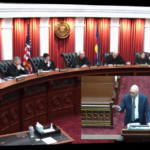COURT CRAWL | SCOTUS eliminates Roe, state Supreme Court powers through final cases

Welcome to Court Crawl, Colorado Politics’ roundup of news from the third branch of government.
The U.S. Supreme Court discarded its longstanding constitutional protection for abortion on Friday, and the Colorado Supreme Court churned out a batch of decisions in anticipation of its summer vacation.
End of Roe v. Wade
• By now, the world is aware the U.S. Supreme Court issued its decision in Dobbs v. Jackson Women’s Health Organization, which overruled the landmark case of Roe v. Wade and eliminated the Court’s own prior recognition of a constitutional right to abortion. In addition to immediately shutting down abortion access for pregnant people in several states, the Dobbs decision will likely jeopardize other rights previously considered beyond debate. Here is some of Colorado Politics’ coverage on the issue:
Permissive abortion law now governs Colorado after U.S. Supreme Court discards Roe
With abortion battle shifting to states, hard work lies ahead, both sides of debate say
Colorado’s politicos, advocates react to U.S. Supreme Court ruling discarding Roe
Five takeaways: What the U.S. Supreme Court’s decision discarding Roe means for Colorado
Abortion-rights protesters march to downtown Denver
Abortion-rights activists gather in downtown Colorado Springs to protest Roe vs. Wade overturning
Democrats eye legislation to enhance abortion protections in Colorado
Catholic bishops to target Colorado’s abortion law, hint of contours of battle after Roe decision
Meanwhile, at the Colorado Supreme Court
• While different from its federal counterpart for many reasons, the Colorado Supreme Court does share one thing in common with SCOTUS: a summer vacation. Last week, the state’s highest court released an eye-popping seven decisions in anticipation of the break, with a final batch scheduled to come out today.
• The justices upheld Colorado’s paid family and medical leave program, which nearly 58% of voters enacted via the ballot box in the 2020 election. A Grand Junction construction company had challenged the payroll premiums funding the program as violating the state’s constitution, an argument the court rejected.
• Vehicle tail lights have to display red light, but not exclusively red light, the court ruled by 5-2. The dissenting justices worried about giving drivers permission to install rainbow-colored tail lights, as long as some red is visible.
• An inmate, the Colorado Department of Corrections and the Supreme Court all agreed that a hybrid method for calculating parole eligibility dates is appropriate. The justices also clarified the corrections department had a duty to use the hybrid calculation, not simply the discretion to do so.
• During a trial in which the jury learned the defendant had fled on two occasions, an Adams County prosecutor told jurors the defendant’s flight continued “up and to this point.” In reality, the defendant was sitting in the courtroom, not fleeing, and the state’s Court of Appeals felt the prosecutor was improperly commenting on the defendant choosing to exercise her right to a jury trial. For the most part, the Supreme Court disagreed with that interpretation, although Justice Richard L. Gabriel saw it the Court of Appeals’ way.
• A suspect taken into custody in Adams County asked a detective if he could call his lawyer. By 5-2, the justices determined that was not a clear invocation of the defendant’s right to counsel. However, the ruling featured an unusual twist: Two members of the majority believed the defendant had, in fact, asked for his attorney. If not for prior court precedent on the subject, they would have sided with the dissenters and the decision would have been 4-3 for the defendant.
• A stepfather who lived with and cared for his stepdaughter for years has the right to petition a court for custody, the Supreme Court decided.
• State law is ambiguous about what happens after a defendant loses a personal injury lawsuit, appeals and receives a new trial. Normally, in addition to the monetary damages, a prevailing plaintiff is also entitled to interest on those damages, starting from the date of an injury through the post-trial judgment. By a 4-2 vote, the Supreme Court said a lower rate of interest applied to the Ford Motor Company when it lost its second trial after appeal. Therefore, the company was off the hook for $1.8 million of the $3.6 million in interest payments a Boulder County judge had awarded.
Other appeals
• In a contentious divorce case out of El Paso County, two ex-spouses could not agree what to do with a pair of fertilized and frozen eggs they had produced following in vitro fertilization treatment. The husband wanted to destroy them but the wife, who believed they were human life, wanted to donate them. A Court of Appeals panel found the trial judge inappropriately considered the wife’s religious beliefs when awarding the embryos to her, and instead ordered the fertilized eggs be given to the husband for destruction.
• Colorado Politics has learned the plaintiffs in two civil lawsuits have asked the U.S. Court of Appeals for the 10th Circuit to rehear their cases en banc — meaning with all of the judges rather than the customary panels of three. The appeals include a 2-1 decision overturning a federal injunction that put restrictions on Denver’s “sweeps” of homeless encampments, and a decision barring a Black corrections worker from suing for a hostile work environment, despite enduring racial slurs and a physical attack.
Vacancies and appointments
• District Court Judge Christopher J. Baumann will be the next chief judge for Denver County following the retirement of Chief Judge Michael A. Martinez.
• There will be a vacancy in the 22nd Judicial District of Dolores and Montezuma counties following the retirement of Chief Judge Douglas S. Walker. Applications are due by July 26. There is also a Larimer County Court vacancy with the retirement of Judge Mary Joan Berenato, with applications due by July 12.
Miscellaneous decisions
• The Colorado Supreme Court’s criminal rules committee has renewed its effort to address implicit racial bias in jury selection after legislation to achieve that same goal failed earlier this year.
• A multimillion dollar contract to a Colorado Judicial Department employee was not the result of her threatened lawsuit, an investigation concluded. The report otherwise found “critical errors in judgment” or “outright misconduct” by multiple department leaders.
• A federal magistrate judge has recommended dismissing the lawsuit of an inmate against the prison guard who allegedly sexually assaulted her, a result driven by a U.S. Supreme Court decision this month narrowing the category of people who can sue for constitutional violations.
• There were insufficient allegations of race-based discrimination and a hostile work environment in the probation office of the 18th Judicial District, a federal judge found in dismissing an ex-employee’s lawsuit.
• A Texas woman and her teenage daughter may proceed with their lawsuit against a Snowmass Village dogsledding operator for injuries they sustained on a runaway sled, a federal judge decided.
















